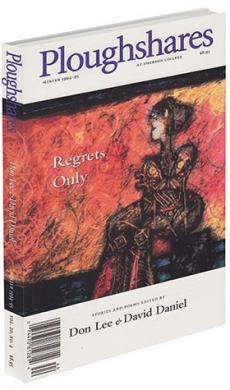rev. of The Great Fires: Poems 1982-1992 by Jack Gilbert
The Great Fires: Poems 1982-1992
Poems by Jack Gilbert. Knopf, $20.00 cloth. Reviewed by David Daniel.
One of the joys of reading Jack Gilbert’s
The Great Fires is how stubbornly it celebrates the courage and beauty found in the most habitual, commonly shared moments of our lives. This will come as news to no one who is a Gilbert reader. Take “The Abnormal Is Not Courage,” the most famous poem from his 1962 Yale Series winner
Views of Jeopardy, which gives this definition of courage: “The marriage, / Not the month’s rapture. Not the exception. The beauty / That is of many days. Steady and clear. / It is the normal excellence, of long accomplishment.” The same theme is developed as well, if somewhat more personally and provocatively, in 1982’s
Monolithos, but
The Great Fires represents a culmination. It is Gilbert’s best and most consistent book, and is easily among the best collections of the year. While it charts familiar territory, sometimes even in familiar ways, it nevertheless reaches greater, more satisfying depths.
Elegies for Gilbert’s wife, Michiko Nogami, which run throughout the book, provide the background against which the other poems come to life. These spare elegies have a quality reminiscent of a classical ruin, equally remarkable for what it is as for what it is no longer. In “Married,” one of the two poems here from Gilbert’s very rare, limited edition,
Kochan, the poet crawls around his apartment after his wife’s funeral, searching for some of her hair: “For two months got them from the drain, / from the vacuum cleaner, under the refrigerator, / and off the clothes in the closet. / But after other Japanese women came, / there was no way to be sure which were / hers, and I stopped. A year later / repotting Michiko’s avocado, I find / a long black hair tangled in the dirt.” Later, in “Michiko Dead,” the weight of her absence is no longer surprising, but, rather, it becomes familiar, something beautifully burdensome, “like somebody carrying a box / that is too heavy,” which he shifts from one position to another “so that / he can go on without ever putting the box down.”
The book’s most powerful poems are not, however, the elegies, but the ones that accept ruined landscapes — of Pittsburgh or Greece, or of marriages failed or failing — and that begin to find new life there, free of nostalgia but born of the past’s deep roots. In “The Forgotten Dialect of the Heart,” discussing the inaccuracy of language, Gilbert dreams “of lost / vocabularies that might express some of what / we no longer can.” Then, when thousands of mysterious Sumerian tablets appear to be merely business records, he wonders, “But what if they / are poems or psalms? My joy is the same as twelve / Ethiopian goats standing silent in the morning light. / O Lord, thou art slabs of salt and ingots of copper / / What we feel most has / no name but amber, archers, cinnamon, horses and birds.” In this book, little by little, Gilbert deciphers the mysterious tablets of our lives, and what he imagines of them is — if not astonishing — alive, sad, funny, and, yes, courageous.


